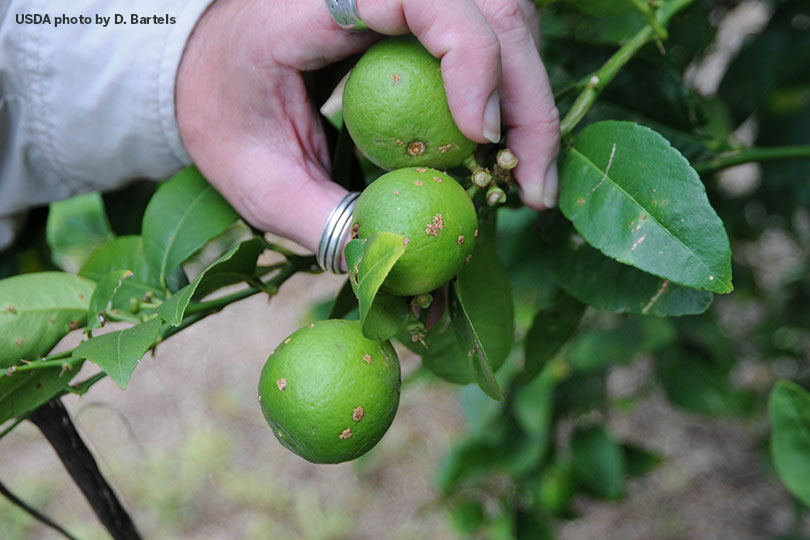By Jennifer Whitlock
Field Editor
Fruit trees in residential yards and commercial properties in Cameron, Hidalgo, Webb, Willacy and Zapata counties are being inspected by the U.S. Department of Agriculture (USDA) Animal and Plant Health Inspection (APHIS) and Texas Department of Agriculture (TDA) for signs of invasive citrus pests and disease.
Inspectors are hanging traps with lures to combat the Mexican fruit fly, also known as Mexfly, which poses a serious threat to the Texas citrus industry. The invasive species has been detected in the Rio Grande Valley, leading to quarantines in Cameron and Willacy counties.
Mexican fruit flies are drawn to ripening fruit, where females will lay eggs. The eggs hatch into larvae, which tunnel through the flesh as they eat, causing fruit to rot. While the insect poses no risk to humans, damaged fruit may be unfit to eat because of rot. More than 40 varieties of fruit and vegetable plants are at risk, including apricots, citrus, peaches, plums and persimmons, all of which are commonly grown in Texas.
Residents can help reduce risk by removing all mature citrus fruit, including fruit that fell on the ground, as soon as possible. Fruit that is not consumed should be double-bagged and placed in the trash.
Moving or mailing homegrown fruit from quarantined areas is inadvisable due to the risk of spreading the pest. Residents are also asked not to compost fruit or vegetables from quarantine areas because larvae may still be present in the decomposing produce.
APHIS and TDA surveyors also will be examining fruit trees for signs of citrus canker and other diseases. Citrus canker is a disease caused by the bacterium Xanthomonas citri.
The bacterial disease does not harm humans but causes significant damage to citrus trees. Fruit from trees infected with citrus canker is safe to eat but sometimes unmarketable due to its blemished appearance.
After making its way to the U.S. from Asia where it originated, citrus canker is now considered endemic in Florida. But with help from residents, officials are working to prevent a permanent encroachment into other southern states.
The disease was detected and confirmed in Cameron County in 2015 and in Hidalgo County earlier this year. It has also been found in the greater Houston area, where there are several active quarantine zones. All varieties of citrus and citrus plant materials are subject to quarantine restrictions and requirements.
The agencies ask residents and business owners to cooperate with survey teams and allow them on to the property for survey work to help stop the spread of these threats to the Texas citrus industry.
USDA and state surveyors working in the field are following all Centers for Disease Control and Prevention (CDC) health guidelines, including social distancing. These surveyors will have official credentials identifying them as USDA or TDA employees.
Mexican fruit fly quarantine restrictions are available from TDA.
Citrus canker quarantine zones are available on an interactive federal map maintained by APHIS and as descriptions and in map form on TDA’s website.
For questions about citrus surveys or to report a citrus health concern, contact the local APHIS office:
- Edinburg – 956.205.7702
- Harlingen – 956.421.4041
- Laredo – 956.726.2225
- McAllen – 956. 632.5300.
For more information on the Mexican fruit fly and other invasive pests, visit HungryPests.com. For more information about citrus canker, visit the APHIS Citrus Diseases webpage.


Looking for Mexican lemon trees,please text me a phone number to call, need prices ,and how much to be shipped to Corpus christi. Thank you. My tree frozen last year